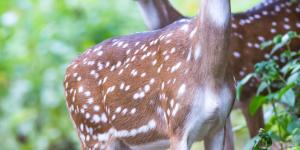Caring for Puppy Dogs: Guidelines and Tips



See files for Dogs
Puppies up for adoption are at what is definitely the sweetest stage of a dog's life, no matter whether they are Pit Bulls, Boxers or German Shepherds. All puppy dogs require the same attention, the same learning process and the same affection. Although this is a fun stage where the whole family works to teach the pup
py about the world, you will also face another side to this process: the constant care the puppy dog requires.
Despite their endearing appearance, you must keep in mind that puppies are not toys; they are living things that have just arrived in this world, and they need someone responsible to stand by them. To help you, AnimalWised will offer you all you some guidelines and tips about caring for puppy dogs.
Caring for a puppy dog at home
Although raising a puppy dog is a fun and wonderful experience, the fact is that it is not as pleasant for the puppy, as it is separated from its mother and siblings. This separation will make your puppy dog look distracted and scared at first. A puppy needs someone to replace the figure of its mother, as dogs are social animals that learn from their community and pack. Do not adopt a puppy dog if you don't have time to devote to it.
You should never adopt a puppy that's younger than 2 months, even if you can feed them a diet for prematurely weaned dogs. You should get organized so that at first there is always someone to keep an eye on the young dog.
Puppies need the same objects as an adult dog: food and water bowls, harness and leash, a comfortable bed and many newspapers if they are not house trained yet. Once everything is ready, you will be able to open your doors to the new member of the family.
First of all, let your new puppy smell, observe and explore its new environment freely and calmly. This is appropriate behavior, as it means that it is relaxed and ready to learn. Be patient at first, because the puppy will not be able to understand what you are trying to convey. We recommend you always teach your puppy through positive reinforcement, offering prizes each time it performs an action that you deem appropriate.
If there are children in the home you should warn them about how they should act towards the new puppy dog, respecting its tranquility and its proper schedule for food and sleep. Routine is extremely important for dogs, and even more for puppies.

Training a puppy dog
Dogs are relatively autonomous animals: even if you train your puppy thoroughly, it will sometimes behave unexpectedly by nibbling on your shoes, peeing on the carpet or digging up your garden.
At about 3 to 4 months old, the puppy dog must go to the vet to have its vaccine shots. After that, it can finally go outside to explore and start its socialization process, where it will learn how to interact with the environment and with other pets.
A puppy's learning process is always easier and faster if it is with its mother, who will guide it properly. If not, it will be you who must teach your dog how to behave by setting rules and always using positive reinforcement. You must never hit, scare or use force with a puppy, as you can traumatize the dog for life - and neither should you do it with an adult dog.
The puppy dog needs to learn to do its business outside, what it can bite and what it can't, and some basic dog commands for its own safety, such as "sit", "come" or "heel". If your puppy belongs to a big breed, it's a good idea to teach it not to jump on people.
The whole family must be involved in the training process: your orders and priorities must be the same, or the puppy will get confused. Promote calm and a positive attitude inside and outside the home so that as an adult the dog reflects a gentle and appropriate behavior.

Feeding a puppy dog
A puppy dog's feeding requirements will be set according to its specific needs; we can advise you regarding dietary habits, but the person who can best assess your particular case is the veterinarian.
For your puppy dog to grow properly you should use dry feed within the Junior range. There are many different types available for purchase on the market. It is advisable to vary the dog's food whatever its stage of life. Dry feed os good, but you should also offer wet food or homemade food from time to time for extra hydration.
Some dogs, such as large breeds, have specific dietary needs. In that case, your vet may recommend extra calcium to prevent possible bone problems or vitamin supplements. Treats are perfect for positive reinforcement, but they can be substituted by emotional treats such as caresses, a walk or a kind word.

If you want to read similar articles to Caring for Puppy Dogs: Guidelines and Tips, we recommend you visit our Basic care category.
Tips
- It is preferable to use a harness rather than a collar, this is to avoid serious eye problems.
- Distribute your puppy dog's food into two daily doses, so to facilitate digestion.
- Always use positive reinforcement.
- Acquire foods and toys that are specific for their age.
- Remember the importance of socialisation: without it your puppy dog can become a scared, aggressive or antisocial dog.
- Ask your vet for advice whenever you need it.
- Do not walk your puppy dog in hours of extreme sun or exercise it for too long.
- Leave available plenty of fresh water.
- Offer it much love and affection.









